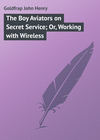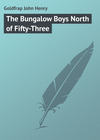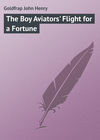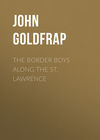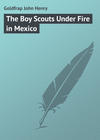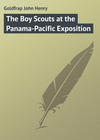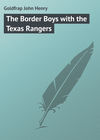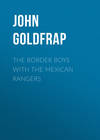Czytaj książkę: «The Boy Aviators on Secret Service; Or, Working with Wireless», strona 6
CHAPTER XI
THE BLACK SQUALL
The boys were so engrossed in discussing the sudden conversion of their late enemy to a friend – or at least to no longer a source of menace – that it was not till a good ten minutes later that Frank suddenly exclaimed:
“The canoes!”
The spot where they had drawn them up was near the margin of the sea and the heavy waves that the approaching storm would stir up would be sure to swamp them if they were not moved from their present position.
“Come on, boys, we’ve got to hurry,” shouted Ben, and followed by the young adventurers he dashed off down the trail that the others had traversed a few minutes previously. They reached the shore just in time to hear three shrill blasts from the released captive’s whistle. He was in his small boat about a hundred yards off shore and looking anxiously about. He had good reason to. The thunder-growls were coming nearer, and far to the south, across the dark cloud curtains, great jagged flashes of lightning were ripping and tearing. The sea, too, was beginning to rise with that peculiar moaning sound that precedes a mighty disturbance of its waters. The rain fell in torrents that whitened the surface of the sea.
The work of getting the canoes hauled into a safe place was soon performed, more especially as they had the aid of several of the moonshiners who had accompanied them to the beach to see the last of the man they would have cheerfully hanged a few minutes before. The small craft were hardly snugly stowed when round the point through the downpour, glided the motor-boat. She was low and long and painted dull black and must have been equipped with powerful engines for she shot through the water like a snake. The man in the dinghy soon clambered on board and turned to wave farewell to the soaking group of watchers on the beach.
“Gee! I’d give a hundred dollars for an umbrella,” remarked Billy.
“I hope that’s his good-bye and not au revoir,” remarked Lathrop. “I think you let him off much too easy, Frank,” he added.
“So do I,” put in Lathrop, “he really deserved some punishment.”
“What were we to do?” asked Frank. “Anyhow if he doesn’t keep his word we know his measure now and can look out for him and see he doesn’t get off so easy next time. Besides, if we had left him here these moonshiners would have been sure to have killed him. Ben Stubbs told me they don’t hesitate to make away with any stranger – ”
“Who hasn’t got a letter of introduction,” Billy finished for him.
“Well, it’s a good thing we had a sponsor, or we might have been ornamenting the foliage.”
As the boy spoke there was a sudden shout from Ben of:
“Holy skysails, look at that!”
The boys’ eyes followed the direction in which he excitedly pointed.
To the southward, before the advancing curtain of lightning torn storm-clouds rolled a great wall of green water, ridged on the top with a line of flaky-white foam. It was tearing along toward them at the rate of an express train.
Fascinated by the spectacle of the mighty wave the boys stood watching it for a moment in awed wonder. Its great volume was outlined against the background of cloud as it reared its foamy crest above the dark level swells like a watery parapet.
As they gazed the same thought struck them simultaneously and a cry of horror broke from the lips of every member of the group.
The motor-boat!
It was directly in the path of the advancing mountain of water.
The two men on board the boat, who had been busied in attaching the dinghy’s painter to the stern cleats, looked up almost at the same moment as those ashore realized their peril. The boys saw them hastily rush to their posts; one forward to the wheel in the bow, the other bending over the engines which had been stopped when the dinghy had been picked up. They were evidently panic-stricken. The noise of their terrified, confused shouts was borne shoreward on the wind.
“Can we do nothing?” asked Harry, horrified at the vision of the two doomed men struggling aimlessly to escape the deadly peril that was bearing down on them.
“Nothing,” responded Frank, as agitated as the younger boy; “if their boat cannot weather that wave nothing can save them.”
The sea in the immediate vicinity of the island began to heave in heavy shouldering swells as the Black Squall advanced and the wave grew nearer and even more menacing as its distance from them decreased. It was apparent that far back as even the canoes were hauled, they would have to be hauled further inland if they were to escape damage. This work was at once set about and the canoes dragged fully a hundred yards from the beach.
“The wave will be all bust up by the mangroves and they’ll not get much more than a wetting up here,” remarked Ben.
This work done, Frank suggested that they climb into the branches of a wide-spreading guava tree so as to be out of harm’s way and also be able to watch the motor-boat’s fight for life.
“We might see a chance to help the poor fellows,” he said.
The moonshiners, with impassive faces, followed the adventurers’ example and soon all of them were roosting in the trees. Hardly had they settled when the mighty wave towered within a few hundred yards of the black motor-boat.
The occupants seemed to have lost their heads completely at the imminence of the danger and were not even attempting to do anything to relieve the situation. The man who owed his life to the boys stood erect in the stern and with his arms folded gazed at the advancing doom. The other was groveling in terror on the boat’s thwarts. Suddenly they saw the man in the stern spring to the engine and crank the machine desperately. The boat began to move rapidly through the swells, tossing their heads in spray over her sharp bow.
“She’s going to race it,” amazedly exclaimed Harry.
“There’s not a chance,” cried Frank, as the boat gathered speed and fled like some frightened creature before the pursuing peril. She fairly leaped through the water like a live thing. With parted lips and throbbing pulses the boys watched the beginning of the unequal struggle. Gamely as the helmsman guided the flying craft over the swells the great wave gained on him. The man who had been groveling in the boat in sheer terror was now on his feet. He hung onto the stern coaming and gazed back as if fascinated with awe at the pursuing Nemesis. The man in the bow never turned his head; he gazed straight forward.
Suddenly a cry that even the boys could hear broke from the lips of the man in the stern.
“The engine’s stopped!” cried Frank.
Even as the words left his lips the giant comber caught the boat’s stern. It raised her up and up till she seemed fairly to stand erect on her bow, stern in air. For an imperceptible segment of time she remained so.
The next second she was blotted out of existence in a mighty vortex of water.
Before the cry of horror at the swift tragedy that had been enacted before them had died from the boys’ lips the wave broke on the shore.
With a crash like the explosion of a powder magazine it smashed itself on the beach and a mighty inrush of water followed. The spray of its landing flew as high as the tree-tops.
“A good thing we’re up here,” cried Billy, as the water came swirling through the jungle beneath them.
“A good thing we hauled the canoes up, you mean,” said Frank, as he anxiously watched the frail craft – as far inland as they lay – picked up like feathers and dashed about by the inroad of the sea. To his relief, however, they survived their buffeting undamaged, thanks to their extra strong construction.
The water rushed back down the sloping shore of the island as swiftly as it had advanced. A few minutes later they were able to descend and hurry to the beach. There was no danger of a second monster wave Ben assured them.
They suddenly realized though that they were dripping wet through from the torrential downpour that had accompanied the storm, but their anxiety to see if any trace of the motor-boat or her occupants reappeared prevailed over their discomfort. They stood on the beach scouring the sea with burning eyes, but it was empty of life. They remained silently gazing before them for several minutes – it was Ben who broke the silence:
“What about the Carrier Dove? Has the wave struck her?” were the words that brought them all out of their reverie with an anxious start.
CHAPTER XII
PORK CHOPS PROVES HIS METAL
It was impossible to consider rounding the island in the canoes in the sea that was running; but this difficulty was got over by Ben, who impressed a guide from the moonshiners’ settlement to guide them around to the spot where they had camped, and off which the Carrier Dove was moored. Arrangements were also made to have the canoes carried across the island later by three strapping young crackers, who were glad of the chance to earn a little money by proffering their services.
These arrangements completed the start across the island was made, and after about three hours traveling the boys reached the spot where they had camped. They hurried anxiously to the beach.
It was evident that the storm had not struck this side of the island with anything like the violence with which it had broken on the other shore. This raised the boys’ hopes for a few moments but they were destined to be as quickly dashed.
No Carrier Dove rode at anchor.
In fact the usually placid sea, still heaving under the influence of the squall which had now passed away, was as devoid of life as a desert as far as their eyes could reach.
It was a bitter moment.
Neither Frank nor Harry dared trust their voices to speak. They swallowed hard while their eyes brimmed at this wretched ending of their hopes.
With the Carrier Dove gone – and more than that with the Golden Eagle II, at the bottom of the sea, it would be useless to keep on. They would have to turn back and admit they had ignominiously failed.
As for Ben Stubbs, he removed his hat, scratched his head and remarked:
“Well, I’ll be double-darned, horn-swaggled – ”
That was all, but there was a wealth of meaning in his tone.
Lathrop and Billy stood to one side, both realized what the Boy Aviators must be suffering at the sudden dashing to the earth of their high hopes. A cruder disappointment could not in fact be imagined. The work of their brains and the fruit of long experiment and research had been swallowed by the same hungry sea that had destroyed two of their enemies.
Practical Ben Stubbs broke the silence.
“Here you get along home and tell ’em to send us some grub,” he ordered the lanky young moonshiner who had escorted them. “I reckon we’ll camp out to-night.”
When the man had hurried off, Ben set to work getting a fire. When he had it in a bright blaze he shouted:
“All hands to the fire to get dry; no use of dying of rumatiz even if the sloop is gone.”
The boys, despondent as they were, saw the wisdom of his words and crowded about the blaze. They stripped to their underwear and hung their garments on a sort of long stick laid across two forked ones stuck in the ground about six feet apart in front of the fire.
“Now, that’s ship-shape,” he remarked when a row of wet clothes were hung on his handiwork to dry in the warmth, “next thing to do is to consider the situation, as the young man said when they offered him a good job as hangman.”
Ben’s flow of spirits had an effect on all the boys, who sat dejectedly around the fire in their wet underclothes. To tell the truth the old adventurer was far from feeling as cheerful as he tried to appear, but like all men who have faced real hardships he knew the value of making the best of a situation.
“Well,” said Frank with a melancholy smile. “What do you make of it, Ben?”
“What did that there poor fellow that’s drownded say to you he done with Pork Chops?” was the irrelevant reply.
“Oh, he said that they had put him ashore early to-day,” replied Frank. “I don’t see what that’s got to do with it.”
“Might have a good deal,” replied Ben. “I wonder where that black lubber is. He’ll have fifty-seven varieties of fits when he finds his boat’s gone – worse’n the skipper’s cat that lost all his nine lives at once when the shop’s rats gave out.”
“He can easily replace that rickety old sloop,” said Harry irritably; “to restore what we have lost will take months of work and more money than we can get.”
“If we can even get back to New York from this moonshining island we’ll be lucky,” grumbled Lathrop.
“Oh, don’t rub it in,” muttered Billy.
It was very plain that all the young adventurers were overwrought. More for the sake of creating a diversion than anything else, Ben said:
“Wonder what’s become of that floating pumpkin-seed the Squeegee?”
“Washed away, I suppose,” said Frank in an uninterested tone. The loss of the ungraceful Squeegee didn’t interest him much at that moment.
“She’d have been washed inshore by the waves,” mused Ben, “if she’d been driven anywhere; besides I hitched her to that tree yonder down by the beach. Hullo, that’s funny,” he broke off suddenly and rapidly walked toward the tree to which the Squeegee’s painter had been hitched. He examined the surface. There was no bit of rope hanging to it as he knew would have been the case if the painter had been snapped.
“Someone untied that rope,” said Ben to himself in a tone of deep conviction.
Hastening up the beach to where the boys were grouped Ben confided his discovery to them.
“Who do you suppose took it?” asked Frank.
“Some no-good moonshiner, I suppose,” snorted Ben indignantly. “Keelhaul those fellows, they’re a natural born pest, the whole boiling of them.”
“Do you think they could have weathered the squall in her?” asked Billy.
Ben laughed incredulously. “No, sir,” he replied. “I doubt he’d last out a squall as long in that craft as it would take a sailor to eat a piece of plum-duff. Whoever took that boat is at the bottom of the sea by now and the Squeegee along with him.”
It was dusk when the young moonshiner returned loaded with provisions for which the boys against his protest insisted on paying. There was a big piece of roast venison, sour-dough bread, roast land crab, a plethoric pot of beans and a plentiful supply of cassava cakes – even coffee had not been forgotten. Everybody cheered up a little at the sight of the food. It is wonderful what heart a good meal, even in prospect, can put into a healthy boy, and our young adventurers were no exception to the rule. Declining their invitation to stay and share the meal the young moonshiner plunged off hurriedly into the home trail.
In fifteen minutes Ben had the coffee ready and the cassava cakes heated on hot stones. After a hearty meal, of which indeed they stood in need, the party donned their clothes, – which were now thoroughly dry, – and earnestly discussed their prospects. Only Ben, who sat apart, took no hand in the conversation. Only once, however, he irrelevantly remarked:
“Keelhaul that Pork Chops, where is he?”
That the boys did not sleep their usual peaceful slumbers that night may be imagined. For hours they tossed and turned under their blankets and watched the fire die down and fade first to a ruddy glow and then to blackness.
It might have been an hour after midnight when the moon rose and shimmered over the sea, now perfectly smooth. Had their minds been at ease the boys would have been enraptured with the beauty of the tropic night. As it was, however, the coming of the moon and the illumination of the sea merely served Frank as an opportunity further to scan the scene for any trace of the Carrier Dove.
Casting off his blanket he hastened to the strip of beach on which the smooth swells were breaking with a milder thunder than usual. With his night-glasses he swept the midnight sea from horizon to horizon. There was no result. Thoroughly dejected he cast himself at the foot of a huge palmetto and gazed intently out to sea riveting his mind on the present situation of himself and the little band of which the Boy Aviators were the leaders.
Suddenly the current of his gloomy thoughts was broken in on by an occurrence which brought him to his feet with a bound.
A low lying group of brilliant stars just above the horizon had been blotted out. Something had passed between the boy and the stars. That something could only be a sail, and a sail meant at least rescue from the island.
With a bound Frank, glasses in hand, was knee-deep in the surf.
It was a sail!
With trembling hands he brought the glasses to a better focus. Intently he gazed till his eyes burned in his head.
The craft was a sloop!
Hardly daring to admit to his mind the wild hope that had suddenly arisen, Frank watched the strange sail as it grew nearer. Before the gentle breeze the craft advanced slowly to within a hundred yards of shore and then a dark figure bounded along her decks and there was a loud rattle from her cable as the anchor was let go and she swung into the wind with flapping mainsail. Another moment and her canvas was lowered with a run and she lay at anchor.
With his heart in his mouth Frank hailed:
“Carrier Dove, ahoy!”
“Dat you, Marse Frank – bress de Lawd – bress de Lawd!” came back across the water in Pork Chops’ rasping voice; but had it been the golden tones of an opera singer that answered his hail the sound could not have been sweeter to Frank’s ear at that moment than Pork Chops’ frog-like croak of welcome.
The Golden Eagle II was safe!
Before the echo of the Carrier Dove’s noisy arrival had died out in the woods, the young adventurers, hand-in-hand, were dancing in a wild circle round the bewildered Ben Stubbs, yelling like Comanches.
“Hurray! Hurray! Hurray!”
CHAPTER XIII
THE FRONT DOOR OF THE ’GLADES
There was little more sleep for the boys that night and when at daybreak half-a-dozen of the moonshiners appeared with the canoe it may be imagined that the boys lost little time in getting aboard the Carrier Dove where their inky navigator was so delighted to see them that he danced a sort of double shuffle of joy from one end of his disreputable craft to the other.
The story of how the Carrier Dove had come to weather the storm was soon told. After the two men, who had not harmed him, had set him ashore from the motor-boat at the other end of the island the black, with the instinct of locality common to his race, had easily made his way to the camp. To his amazement it was deserted and he was filled with fear that some disaster had happened to the boys and Ben. He had not much time for speculation however, for hardly had he looked about him when the rapid approach of the black squall that had caused such havoc on the other side of the island made him bestir himself to get his beloved Carrier Dove to a safer place than her present anchorage. He therefore jumped into the Squeegee and rowed out to his craft. He had just time to set her sails and up anchor when the squall struck down in all its fury. Pork Chops told his story with a wealth of gesture and dramatic effect and the boys could hardly refrain from bursting into roars of laughter as he described “de mon’surious wabe what had rised up out of the sea like yeast bread an’ et up de po’ li’l Squeegee.”
“How high was the wave. Pork Chops?” asked Frank.
“’Bout as high as de highes’ mountain you ever see, Marse Frank, and dat am a solemn gospel fact,” averred Pork Chops. “He ris’ so high above de ol’ Carrier Dobe’s mas’ dat it ’peared lak I could’n see no sky.”
“Oh, come, Pork Chops,” laughed Harry, “you’ll have to take a little off the top of that wave.”
“Won’ tak off not a single solingtary inch, Marse Harry,” indignantly replied the skipper of the sloop. “I wish ah may nevah see Miami again ef dat dar wabe weren’t jus’ as I done describe him to you.”
“Well, it was pretty big and that’s a fact,” said Billy Barnes with a wink at the others, “but you must have magnifying eyes to see it as big as you describe it.”
“Hoi’ on dar a minute, Marse Barnes,” earnestly said the old negro, “ah don’ know jus’ what you mean by dat dar magnaminous eye, but tell me didn’ you all see dat dar wabe from de udder side ob de island?”
“Certainly,” said Lathrop, “what’s that got to do with it?”
“Wall, it mus’ jus’ naturally have growed by de time it got round here; das all ah got to say,” triumphantly concluded the old darky.
Continuing his narrative Pork Chops told how the little sloop had driven through the water “faster than de fastest ex-press you eber seen.” He didn’t forget either to pay himself a high tribute to his own skill as a mariner.
“Reckon dat ol’ man Noah didn’t have nothin’ on Cap’n Pok Chops when it come to sailin’ roun’ wid skill and duxturity,” he remarked.
“Well,” commented Frank, “we don’t want to spoil you by too much praise, Pork Chops, but that certainly was an A No. 1 feat of yours, and I never heard a more welcome sound than that croak of yours when you dropped anchor.”
After despatching huge quantities of fried bacon and coffee, cooked on the battered sea stove the Carrier Dove’s cabin boasted, and which Pork Chops proudly referred to as “de galley,” the adventurers up anchored and with their little engine chugging merrily away stood on toward the south. The canoes in a long tandem-like line were towed astern, as there was every prospect of smooth water for the rest of the day.
As the Carrier Dove bore past the southern end of the island a canoe shot round the point. In it were two figures. One was the moonshiner who had been so anxious to despatch the unfortunate Nego, the other was a younger man whom the boys recollected to have seen in the camp the day before. They waved and shouted something that the boys could not catch but, as they evidently had some important object in paddling out, the young commander ordered the engine stopped and the Carrier Dove lay to, rising and falling on the long swells over which the canoe rode as gracefully as a sea-bird.
A few moments later the canoe ran alongside and the elder of the two men addressing Frank said:
“Wall, the bodies of them two came ashore this morning and on the one you wouldn’t let us string up we found this.”
He fumbled in his homespun shirt a minute and then produced a tiny carved figure of green jade. It was the image of a squatting Buddha and evidently of great antiquity.
“Was this all you found?” said Frank, examining the quaint figure with interest.
“Sure,” replied the other unblushingly, “ain’t it worth something to you ’uns for we ’uns to hev fetched it to you?”
Frank knew that the man lied when he said that the little jade god had been the only thing found on the dead man but he did not deem it worth while to contradict. He had little doubt that the dead man’s watch and diamond rings were at that moment in the possession of the individual who had addressed him, or some other of the moonshiners. He, however, took the hint conveyed in the man’s last words and handed him over a bill. The fellow took it without a word and shoved off.
“You ’uns may get out of the ’glades alive but I don’t believe it,” were his parting words.
“He’s got what you might call a nice sweet disposition that feller,” remarked Ben, as the canoe was rapidly paddled away and the adventurers got under way once more, “he’d make a good shipmate, he would, with that sunny nature of hisn.”
Frank examined the little jade god with close attention while the others leaned over his shoulders. The figure was not much more than two inches high and of beautiful workmanship. It was evidently of great antiquity and seemed to have been venerated as a charm by successive generations, for it was worn quite smooth in parts as if from constant rubbing against the clothing of the person wearing it.
At the top of the head there was a small opening, round the edges of which were inscribed characters that were meaningless to the boys.
“What do you suppose is the significance of it?” asked Harry.
“It is evidently some sort of an amulet,” responded Frank.
“I’ve seen ’em in China and Japan,” put in Ben Stubbs, “whistling gods they call ’em there. Lend it here a minute.”
Frank handed it to him and Ben put his lips to the orifice at the top of the figure’s head. He blew hard in it and the figure gave out a clear, penetrating note that evidently traveled a long distance, for the two moonshiners stood up in their now distant canoe and gazed back in astonishment at the sound.
“Them Chinas and Japs set a high value on these,” commented Ben, “some of ’em would give their lives for one.”
“Well, we’ll keep it as a souvenir,” remarked Frank, slipping it in his pocket. “It will be amusing to have it to recall some of our adventures when we get back to New York.”
That afternoon a good brisk breeze from the northwest sprang up and the Carrier Dove with her canvas spread bowled along at a good ten knots before it, heeling over till the foam creamed at her lee scuppers. It was exhilarating sailing. After a long series of alternate calms and favoring breezes the adventurers’ craft finally rounded Cape Sable and shortly afterwards entered the maze of channels, islands, sandbars and treacherous shoals that make up the Ten Thousand Island Archipelago.
The young adventurers had finished the first stage of their daring enterprise. By far the most difficult part lay before them. As Frank put it they had arrived “at the front door of the Everglades,” what lay beyond was only conjecture.
According to the prearranged plan they were to cruise about at the edge of the archipelago till the Tarantula hove in sight and they could make final arrangements for wireless codes and signals and also complete the plan of rescuing Lieutenant Chapin and getting the formula out of the hands of those who had it. After two days of waiting, which sadly irritated the boys, who were keenly impatient to begin their task, one morning the placid waters of the gulf were furrowed by the sharp bow of the Tarantula and the Carrier Dove sailed out to meet her.
On board the destroyer the boys were greeted by a very youthful looking lieutenant, whose name was Selby. He explained that his orders were to keep in constant touch with the expedition, so far as was possible, by wireless and that if they were missing without sending any word for more than a week he was to take a squad of men and penetrate the Everglades in search of them.
He was very anxious for the boys to take several picked men of his crew along with them in their bold dash. But Frank and Harry, after a brief consultation, agreed that the force they had at present formed a good working unit and there was no need of shortening their supplies and overloading the canoes by taking any more. After a dinner aboard the hospitable Tarantula the boys dropped over the side into the Carrier Dove, which had lain sociably alongside the grim war-vessel while they were aboard, and with warm words of farewell from Lieutenant Selby and a cheer from the crew, among whom word of what was on foot had spread in some mysterious way, they started for the maze of islets and channels beyond which lay the mouth of the Shark River. They anchored that night off a small island covered with a dense undergrowth that promised snakes and that there was at least one variety of reptile ready to receive them was evidenced when, as the Carrier Dove’s anchor rattled down into about twelve feet of water, a huge body slipped off the bank and slid into the water with a sullen splash.
“An alligator!” cried the boys.
“No, sah,” rejoined Pork Chops, “dat dar ain’t no ’gator, dat’s a crokindile and where dey are dere’s mischief.”
“Are they more dangerous than alligators?” asked Frank.
“More dangerouser!” scornfully replied Pork Chops. “Ah should jes’ say dey is. ’Gators – huh! they am big cowards, but crokindile he’ll fight yer till his teef drap out – yes, sah, they’s bad critters is crokindiles.”
“I’d like to get that fellow’s skin though,” said Frank.
The old darky scratched his head.
“Wall, sah,” he said; “I ain’t saying that dat’s impossible. ’Spose we try to git him by jacklight.”
“By jacklight?” exclaimed Lathrop wonderingly.
“I’ve read about that,” replied Frank, “it is supposed to be the most effective way of trapping these saurians. Now as there isn’t much to do before tomorrow, after we have unloaded our duffle and got it stowed in the canoes, we might as well have a little pot-hunt after supper.”
The boys enthusiastically agreed and the work of getting the duffle off the Carrier Dove and into the canoes for transportation into the Everglades went ahead with a will. By supper time the canoes which were to be occupied by Frank and Harry were completely loaded and there only remained the stowing of the few additional sections of the Golden Eagle II in the craft that were to be paddled and poled by Billy Barnes, Lathrop and Ben.
Supper over, old Pork Chops rigged a lantern up in the bow of one of the canoes and fitted a strip of canvas over it.
“No use letting Mister Crokindile know what we’re going to do till we git ready,” he remarked as he hooded the light.
As only one of the canoes could be used, the others being loaded down, it was agreed that Frank and Harry should occupy it with old Pork Chops and the others would watch the fun from the deck of the Carrier Dove. The spot where the Carrier Dove lay was a sort of natural basin enclosed by the thickly grown islands all about. Pork Chops paddled almost noiselessly into about the center of the enclosed pool and then stopped. Then came a dead silence for more than half an hour broken only by the occasional nightcry of some bird or creature of the jungle and the sharp clicks of the adventurers’ rifles as they got them ready for action.
Suddenly the quiet was broken by a roar like that of an enraged bull.
“Heah he comes foh shuh,” commented Pork Chops with his hand on the hood of his lantern.
